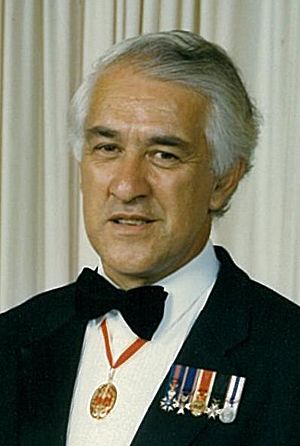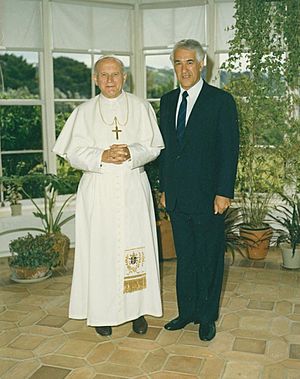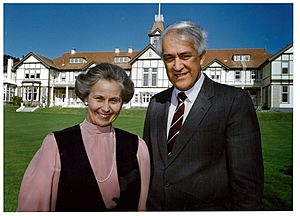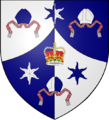Paul Reeves facts for kids
Quick facts for kids
The Most Reverend and Honourable
Sir Paul Reeves
|
|
|---|---|

Reeves in 1987
|
|
| 15th Governor-General of New Zealand | |
| In office 20 November 1985 – 29 November 1990 |
|
| Monarch | Elizabeth II |
| Prime Minister | David Lange Geoffrey Palmer Mike Moore Jim Bolger |
| Preceded by | Sir David Beattie |
| Succeeded by | Dame Catherine Tizard |
| Chancellor of Auckland University of Technology | |
| In office 1 February 2005 – 13 August 2011 |
|
| Succeeded by | John Maasland |
| Personal details | |
| Born | 6 December 1932 Wellington, New Zealand |
| Died | 14 August 2011 (aged 78) Auckland, New Zealand |
| Spouse | Beverley Watkins |
| Children | 3 |
| Profession | Anglican bishop |
Sir Paul Alfred Reeves (born December 6, 1932 – died August 14, 2011) was an important leader in New Zealand. He was an Anglican bishop and also served as the 15th Governor-General of New Zealand. This made him the first Governor-General of Māori descent, which was a very special achievement. He was also the leader of the Anglican Church in New Zealand from 1980 to 1985.
Contents
Early Life and Education
Sir Paul Reeves was born in Wellington, New Zealand, on December 6, 1932. His mother, Hilda Pirihira, was of Māori descent, from the Te Āti Awa iwi (tribe). His father, D'arcy, was Pākehā (non-Māori New Zealander) and worked for the tramways.
Paul grew up in Newtown, a working-class area of Wellington. He went to Wellington College for his high school education. Later, he studied at Victoria University of Wellington, where he earned a Bachelor of Arts and a Master of Arts degree.
After university, he decided to become an Anglican priest. He studied at St John's College, Auckland to prepare for this role.
His Journey as a Priest and Bishop
Becoming a Priest
Paul Reeves became a deacon in 1958. After a short time working in Tokoroa, he moved to England for several years. There, he continued his studies at St Peter's College, Oxford. He was ordained as a priest in 1960. He worked in churches in England before returning to New Zealand.
Back in New Zealand, he served as a Vicar (a type of priest) in Okato. He also taught Church History at St John's College in Auckland. He worked to educate people about Christianity for the Anglican Diocese of Auckland.
Leading the Anglican Church
In 1971, Paul Reeves became the Bishop of Waiapu. A bishop is a senior leader in the church. He then became the Bishop of Auckland in 1979.
From 1980 to 1985, he held the highest position in the Anglican Church in New Zealand. He was the Archbishop and Primate of New Zealand. This meant he was the main leader for all Anglicans in the country. During this time, he also led the Environmental Council and the National Council of Churches in New Zealand.
Serving as Governor-General

How He Was Appointed
In 1985, Queen Elizabeth II appointed Sir Paul Reeves as the 15th Governor-General of New Zealand. The Governor-General is the Queen's representative in New Zealand. This appointment was suggested by the Prime Minister at the time, David Lange.
Some people were unsure about his appointment because he had been involved in politics and was a bishop. However, many Māori groups were very happy. They saw it as a step forward for Māori people, showing the spirit of the Treaty of Waitangi. Sir Paul Reeves was the first person of Māori descent to hold this important role. He was also the first priest to become Governor-General.
His Time in Office
As Governor-General, Sir Paul Reeves chose not to wear the traditional military uniform. He wanted to connect more with everyday New Zealanders. He joined a local residents' group and invited them to visit Government House, Wellington, which is the official residence of the Governor-General.
He also held the first "open day" at Government House in 1990. This allowed the public to visit and learn about the role of the Governor-General. He also hired the first public affairs officer to help explain the Governor-General's job to people. Sir Paul Reeves served until November 1990.
Life After Being Governor-General
After his time as Governor-General, Sir Paul Reeves continued to work in important roles. He worked with the United Nations in New York and served as an Assistant Bishop there. He also became the Dean of a theological college in New Zealand.
He played a key role in international affairs. He helped lead a group observing elections in South Africa. He also chaired the Fiji Constitution Review Commission, which helped Fiji rejoin the Commonwealth.
From 2005 until his death, he was the Chancellor of the Auckland University of Technology. This is a top leadership role at a university. In 2004, he also shared his thoughts on New Zealand becoming a republic, saying he would support it.
Sir Paul Reeves passed away on August 14, 2011, at the age of 78, after being diagnosed with cancer.
Awards and Honours
Sir Paul Reeves received many important awards and honours throughout his life. These included:
- The Queen Elizabeth II Silver Jubilee Medal (1977)
- Being made a Knight Bachelor in 1985, which allowed him to use the title Sir.
- Being awarded the Knight Grand Cross of the Order of St Michael and St George in 1985.
- Being awarded the Knight Grand Cross of the Royal Victorian Order in 1986.
- Becoming a Companion of the Queen's Service Order in 1990.
- Being made a Companion of the Order of Fiji.
In 2007, he received New Zealand's highest honour when he was admitted to the Order of New Zealand. He also received several honorary degrees from universities around the world, recognizing his contributions.
Images for kids
See also
 In Spanish: Paul Reeves para niños
In Spanish: Paul Reeves para niños



